For the first 129 years of its existence, college football had no need for an official national championship. The sport came to life in 1869, six months after the Intercontinental Railroad connected the country from coast to coast. The United States was barely a nation, its wounds from the Civil War still mending.
Colleges played nearby colleges. National sports were hardly national -- Major League Baseball didn't extend west of St. Louis. The NFL, which didn't exist until 1920, pushed the frontier only as far as Rock Island, Illinois, about 2,000 miles from the Pacific Ocean. The NCAA didn't stage a championship in any sport until 1921. The NBA didn't exist until after World War II.
No one thought of naming a national football champion until the '20s, when sports editors seized upon mathematical rankings (and later, polls) as a gimmick to sell newspapers. By then, the Rose Bowl had established itself as a postseason destination. In the 1930s, other bowls followed, and soon the bowls divvied up the best teams by region. Matchups between No. 1 and No. 2 were rare during the season and rare afterward. In fact, from the middle of 1946 to the end of 1962, the top two teams never played one another. Think of that 16-year drought applied to the modern day: No Texas-USC, no Auburn-Oregon, no Alabama-Clemson I or II.
It's pretty simple: To have a great title game, you have to have a title game. It took college football 129 years to mandate one, and even at that, the BCS could be best described as "better than what we had." The BCS lasted 16 seasons before the college football commissioners developed the four-team playoff. The past three championship games, decided by five, four and three points, are high on this list. Alabama and Clemson played two of those. There's every reason to believe that Tide-Tigers III will join them.
Welcome to the golden age of title games. Two teams from the Deep South will play in Santa Clara, California. That sounds like a national championship game to me.

1. Jan. 4, 2006
Texas 41, USC 38
Rose Bowl, Pasadena, Calif.
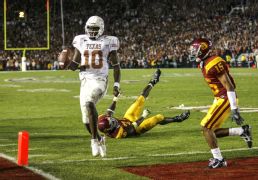
Few games generate as much hype, and fewer still exceed it. The No. 1 Trojans played for their 35th consecutive victory; the No. 2 Longhorns for respect and the validation of quarterback Vince Young, Heisman runner-up to USC tailback Reggie Bush. The Rose Bowl featured five lead changes, a manic fourth quarter that included four touchdowns and a field goal, and Young, giving the greatest championship game performance ever (267 passing yards, 200 rushing yards). The Trojan Dynasty ended with :19 to play, when Young scored from the 9 on fourth-and-5. "He's got it!" crowed ABC broadcaster Keith Jackson, the last touchdown call of his brilliant career.

2. Jan. 8, 2018
Alabama 26, Georgia 23 (OT)
College Football Playoff National Championship, Atlanta
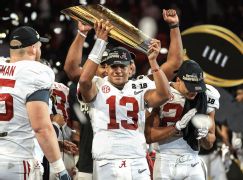
With one 41-yard, second-and-26 touchdown pass in overtime, Alabama freshman Tua Tagovailoa became a legend without starting a game. The little-used Tagovailoa led a back-from-the-dead comeback by the Crimson Tide. Down 13-0 at the half, the Tide won a game they never led until it ended. Georgia coach Kirby Smart appeared as if he would become the first former assistant in 12 tries to beat Alabama coach Nick Saban. Instead, Saban won his sixth national championship, tying the modern-era record set by Bryant in 1979.

3. Dec. 31, 1973
Notre Dame 24, Alabama 23
Sugar Bowl, New Orleans

Two traditional powers meeting for the first time with undefeated records and a national title at stake. Two legendary coaches engaging in a 60-minute chess match. After six lead changes, Alabama pinned Notre Dame at the Irish 2-yard-line on third-and-8. With Tide coach Bear Bryant figuring on a punt and hoping for a safety, Irish coach Ara Parseghian had quarterback Tom Clements throw deep to backup tight end Robin Weber, who had one catch all season. The 36-yard gain let Notre Dame run out the clock. Checkmate. The Irish, who spent 44 seasons refusing to play in bowls, climbed to No. 1 because they played in one.

4. Jan. 11, 2016
Alabama 45, Clemson 40
College Football Playoff National Championship, Glendale, Ariz.
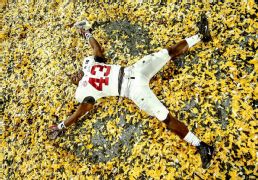
Saban, who has few peers as a video detective, found three weaknesses in Clemson that the Crimson Tide exploited in a three-minute span of the fourth quarter. A perfect onside kick set up a 51-yard touchdown pass to tight end O.J. Howard -- his second long score of the game. After a Clemson field goal, Tide returner Kenyon Drake took a kickoff 95 yards for a touchdown. Five lead changes and three ties, not to mention five touchdowns and two field goals in the fourth quarter, made the game a keeper. No. 1 Clemson, making its first title-game appearance in 34 years, proved that it belonged. But the Tigers failed to prove that they belonged at the top.

5. Jan. 9, 2017
Clemson 34, Alabama 31
College Football Playoff National Championship, Tampa, Fla.
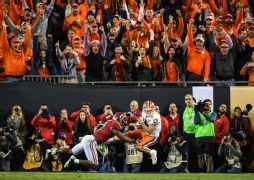
Clemson won this championship rematch thanks to a magnificent performance by Clemson quarterback Deshaun Watson (463 total yards, four touchdowns). The defining moment came when Alabama quarterback Jalen Hurts ran 30 yards for a touchdown to put the Tide ahead 31-28. Defining? Yes. Anyone who watched the first 58 minutes of Watson understood that the Tide scored too soon. Watson led a nine-play drive against an exhausted Tide defense and threw a 2-yard touchdown pass to Hunter Renfrow with :01 left for the winning score. Clemson finished one play short of 100 snaps. Alabama finished one play short of defending its title.

6. Jan. 2, 1987
Penn State 14, Miami 10
Fiesta Bowl, Tempe, Ariz.
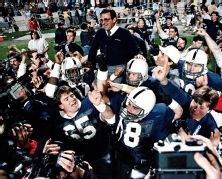
No. 2 Penn State wore its trademark white helmets and the figurative white hats in this Fiesta-Bowl-turned-morality-play. No. 1 Miami reveled in its bad-guy image. Neither the Nittany Lions nor the Hurricanes belonged to a conference, which made them available to play one another. The Fiesta Bowl lured them west, and NBC pounced on the narrative, moving the game off New Year's Day into prime time the next night. Miami quarterback Vinny Testaverde, suffering from the Heisman flu, threw five interceptions, the last on fourth down at the Penn State goal line in the final seconds. The guys in the white hats won. New Year's Day lost.

7. Jan. 3, 2003
Ohio State 31, Miami 24 (2OT)
Fiesta Bowl, Tempe, Ariz.
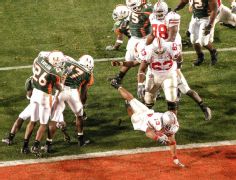
The fireworks exploded over the desert sky, celebrating Miami's second consecutive national championship and 35th straight game. Except field judge Terry Porter flagged Hurricane defensive back Glenn Sharpe for pass interference in the end zone. You can't unlight a firework, but you can unwin a game. Given a reprieve, Ohio State scored the tying touchdown, and two overtimes later, the Buckeyes scored again, finishing No. 1 for the first time since 1968. Miami? Surely the dynasty that won five titles in two decades would win another. But in 2003, the Hurricanes fell to fifth in the final AP poll. They haven't finished in the top 10 since.

8. Jan. 1, 1979
Alabama 14, Penn State 7
Sugar Bowl, New Orleans
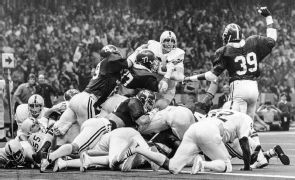
One of the great defensive struggles of the modern era turned on two fourth-quarter stops by the Crimson Tide. No one remembers Alabama corner Don McNeal's end-zone interception only because, after a Tide fumble, Penn State quickly moved to first-and-goal at the 8. McNeal made a second-down stop at the pylon. Two dives over the top failed -- on fourth down, linebacker Barry Krauss knocked Mike Guman back and knocked himself out. Penn State coach Joe Paterno, who had overruled his instinct to pass on fourth down, waited four more years for a national championship. Bryant became the best -- and at the time only -- coach in the modern era to win five.

9. Nov. 29, 1930
Notre Dame 7, Army 6
Soldier Field, Chicago

An icy field made good footing rare and points rarer. The teams combined for seven fumbles and 34 punts -- by the fourth quarter, Army punted on first down. Finally, with 4:00 to play, Irish halfback Marchy Schwartz rambled 54 yards for a touchdown. In the final minute, Army's Dick King bull-rushed through three blockers to block a punt, and teammate Harley Trice fell on it in the end zone. But kicker Chuck Broshous's dropkick extra point skittered into the line. Four months later, Army coach Ralph Sasse went into Broshous's room at West Point to tell him that Irish coach Knute Rockne had died in a plane crash. "I can honestly say that I am glad you missed that kick," Sasse said.

10. Jan. 6, 2014
Florida State 34, Auburn 31
BCS National Championship Game, Pasadena, Calif.

Off the field, Seminoles freshman quarterback Jameis Winston faced an investigation of sexual assault and the notoriety that came with it. He found his escape on the field, where neither law enforcement nor opposing defenses could stop him. Florida State won 13 games by at least two touchdowns. But Auburn jumped to a 21-3 lead as Winston, on his 20th birthday, looked nothing like the guy who won the Heisman. Florida State clawed back into the game in the fourth quarter, and with 1:19 to play, Winston led the Seminoles 80 yards in seven plays, throwing the winning 2-yard touchdown to Kelvin Benjamin with :13 to spare. The last BCS Championship proved to be one of the best.

11. Jan. 2, 1984
Miami 31, Nebraska 30, Orange Bowl, Miami
Georgia 10, Texas 9, Cotton Bowl, Dallas
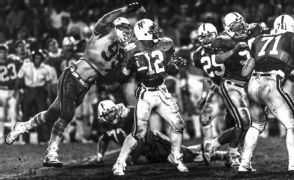
Two unlikely plays led to an unlikely champion -- and made Huskers coach Tom Osborne an unlikely hero. Osborne gained public acclaim for going for two points and the victory over the No. 5 Hurricanes when an extra point would have created a tie, allowing Nebraska to remain No. 1 as the only unbeaten team. But if the No. 2 Longhorns, the only other unbeaten, had won the Cotton Bowl that afternoon, Osborne would have been forced to go for two points anyway. Texas dominated the No. 7 Bulldogs only to fumble away a 9-3 lead when Craig Curry muffed a punt at the Texas 23 with 4:30 remaining. Georgia quarterback John Lastinger ran 17 yards for the winning score.

12. Nov. 20, 1909
Yale 8, Harvard 0
Harvard Stadium, Allston, Mass.
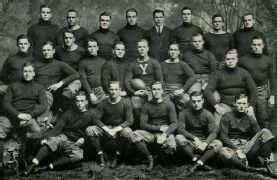
Already the 30th meeting of the rivals, these teams were both considered the best in their school's history. Harvard had allowed one touchdown and one field goal all season; Yale, not a single point. A play-by-play account of the game was telegraphed not only to the Harvard Club in New York, but also to a gathering of fans of both teams in Berlin. Neither team threatened to score a touchdown, but the punting and placekicking of All-American fullback Ted Coy proved too much for the Crimson to overcome. Harvard and Yale would not play each other again with undefeated records for 59 years, the infamous Harvard 29-29 "victory."

13. Jan. 10, 2011
Auburn 22, Oregon 19
BCS National Championship Game, Glendale, Ariz.
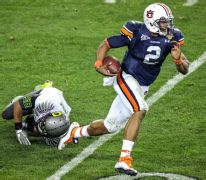
It's hard to knock any championship game decided on the final play. The Tigers and Ducks provided great competitive tension but at the expense of the efficiency they had shown all season in their newfangled, up-tempo spread offenses. Try three interceptions in the first 10 minutes or, later, goal-line stands by each defense. After that sloppy start, the Tigers and Ducks settled into a taut battle. Auburn tailback Michael Dyer's stop-action, 37-yard run to the Oregon 23 -- he rolled over a tackler without a knee or elbow touching the ground, stood up and kept going -- set up the game-winning kick by Wes Byrum. The Tigers became the fourth SEC team to finish No. 1 in five seasons.

14. Jan. 1, 1994
Florida State 18, Nebraska 16
Orange Bowl, Miami
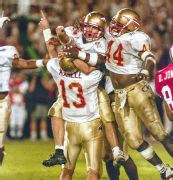
The debate over whether Osborne or the Seminoles' Bobby Bowden held the title of Best Coach Never to Win a National Championship would be settled, and both teams played as if they wanted their coach to hold on to that distinction. A defensive battle gave way to a frantic battle of kickers at the end. Nebraska's Byron Bennett made a 27-yard field goal with 1:16 to play, but Seminole freshman kicker Scott Bentley put Florida State ahead again with a 20-yarder, his fourth field goal of the game, with :21 to play. Bennett's 45-yarder to win at the gun missed badly, the Huskers' last misstep for a while. They won their next 25 games.

15. Nov. 30, 1905
Chicago 2, Michigan 0
Marshall Field, Chicago
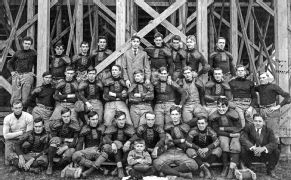
The smart money gave the 9-0 Maroons no chance to win. After all, this was Michigan, which hadn't lost a game (55-0-1) in five years. The 10-degree weather on Thanksgiving Day didn't deter a crowd of 27,000, excluding the women allowed in men's dorms to watch the game from the windows. The lone score came late when Wolverine star Dennison Clark attempted to return a punt from near his own goal. Two Maroons tackled him in the end zone. Some 2,500 Chicago students and alumni followed the university band in an impromptu, postgame parade. Clark never forgave himself. In 1932, he ended his life, writing that he hoped it would atone for his mistake 27 years before.

16. Jan. 2, 1978
No. 5 Notre Dame 38, No. 1 Texas 10, Cotton Bowl, Dallas
No. 3 Alabama 35, No. 9 Ohio State 6, Sugar Bowl, New Orleans
No. 13 Washington 27, No. 4 Michigan 20, Rose Bowl, Pasadena, Calif.
No. 6 Arkansas 31, No. 2 Oklahoma 6, Orange Bowl, Miami
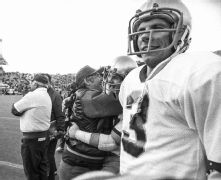
Losses to Notre Dame had cost Alabama two of the previous four national championships. This time, the Tide won their bowl only to lose again to the No. 5 Irish, the highest-ranked team not committed to a bowl. The four teams ahead of Notre Dame, all conference winners, had no say in where they played. Notre Dame took the opportunity to play the No. 1 Longhorns and humiliate them. When Michigan lost and Arkansas stunned the Sooners, the Irish rout bounced them over the Crimson Tide, which played a Buckeyes team invited to the Sugar Bowl because (A) no Big Ten team had ever played in one and (B) Bryant and Buckeye coach Woody Hayes had won 501 games between them.

17. Jan. 1, 1966
No. 4 Alabama 39, No. 3 Nebraska 28, Orange Bowl, Miami
No. 5 UCLA 14, No. 1 Michigan State 12, Rose Bowl, Pasadena, Calif.
LSU 14, No. 2 Arkansas 7, Cotton Bowl, Dallas
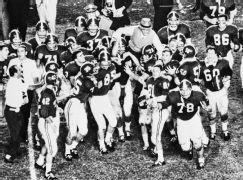
Alabama might have had a loss and a tie, but Bryant saw a path to No. 1. He wrote it on the locker room chalkboard for his players before the Orange Bowl. He predicted that the Bruins would upset the Spartans and that the unranked Tigers -- the AP ranked only 10 teams that year -- would upset the Razorbacks. LSU won as Alabama left its hotel. When the Tide went to the locker room at halftime with a 24-7 lead over the favored Huskers, the team learned that the Bruins had won, too. Alabama closed out the victory. "I never doubted Coach Bryant, because he was usually right," end Dennis Homan said in the book "The Missing Ring." "But that was shocking."

18. Nov. 20, 1943
Notre Dame 14, Iowa Pre-Flight 13
Notre Dame Stadium, South Bend, Indiana
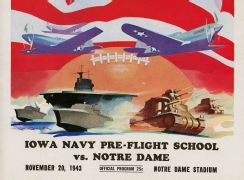
The No. 2 Seahawks won their first eight games by at least 14 points. Notre Dame remained No. 1, winning each game by at least 19 points even though offensive leader Angelo Bertelli went into the service at midseason (he won the Heisman anyway). Iowa Pre-Flight left the door open when kicker Bernie McGarry missed a fourth-quarter extra point, and Notre Dame took its first lead with eight minutes to play. The Seahawks then moved deep into Irish territory twice but had only a missed field goal to show for it. This game must have been for the national championship, because Notre Dame lost a week later to unranked Great Lakes Naval Training Station and still finished No. 1 in the final poll.

19. Jan. 1, 1991
Colorado 10, Notre Dame 9
Orange Bowl, Miami
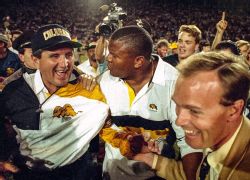
Three weeks into the season, Colorado had a 1-1-1 record and sank to No. 20. The Buffs needed a fifth down to beat Missouri. Quarterback Darian Hagan blew out a knee just before halftime of this game. Yet the Buffs persevered. Backup quarterback Charles Johnson converted an Irish turnover into a third-quarter touchdown. Stout defense and a blocked extra point kept the Irish at bay. So did a clipping call that negated Rocket Ismail's 91-yard punt return for a touchdown in the final minute. It might not have been artistic. It might not have been correct -- was that really clipping? And it didn't convince the coaches, who voted Georgia Tech No. 1. But the Buffs shared the top.

20. Jan. 1, 1975
USC 18, Ohio State 17
Rose Bowl, Pasadena, Calif.
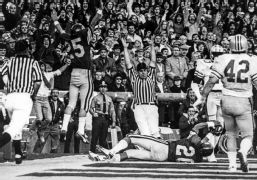
The winner of the third straight Rose Bowl between these teams would have an outside chance at finishing atop the UPI coaches poll (AP No. 1 Oklahoma, on NCAA probation, was ineligible). No. 5 USC held two-time Heisman winner Archie Griffin under 100 yards and forced him to fumble twice, yet No. 3 Ohio State still led for most of the game. In the final two minutes, the Trojans' Pat Haden threw a 38-yard touchdown pass to his best friend, the coach's son, J.K. McKay, to pull USC within 17-16. Haden found Shelton Diggs in the corner for the winning two-point conversion. That night, No. 2 Alabama lost the Orange Bowl, and that outside chance became head coach John McKay's fourth and final No. 1.

